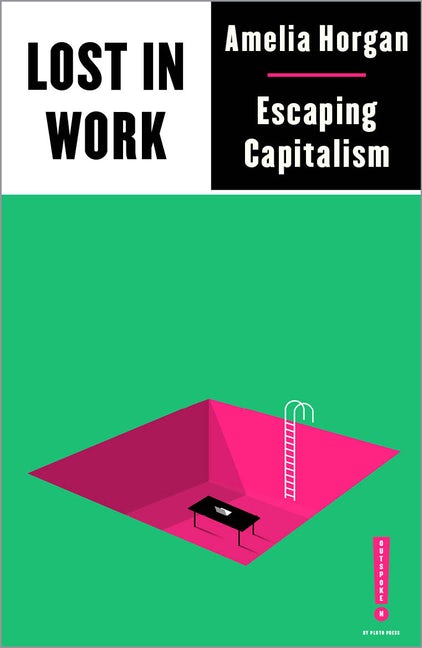By Amelia Horgan, Pluto Press (2021)
Quite a challenge to write a book about work and considering we all do it, quite unusual.

Nearly every day on the news Boris Johnson talks about creating well-paid jobs and opportunities for all. In fact, so does virtually every Labour politician.
This book really demolishes their uncritical, unproblematic notion of work and jobs. It is short and therefore uses particular examples of one trade to illustrate its argument.
In the introduction, the author shows how Covid in workplaces was covered up by the mechanism of allowing the employer to declare whether the employee contracted it at work or in ‘the community’. This meant that very few employers were investigated by Health and Safety regulators and anyway it was declared not to be life-threatening, so the powers to act were less. In the Food industry, only 47 cases were declared yet media reports covered over 1400. This illustrates the power relationship in the workplace. Incidentally, Horgan was suffering from Covid whilst writing the book
The industry she chooses is the clothing industry. She describes its history from communal production to domestic production in homes to sell on, then on to factory production, Slave produced cotton was processed in factories including by child labour. Garments were mostly produced in small sweatshops. Then the development of standard sizes, needed for armies at first, moved clothes on to mass production. This work was first undertaken in places like New York, but workers organised and so bosses moved to cheaper states and then to countries like China.
More recently a change came with the production of instant fashion. Fashion companies paid influencers to wear their garments, creating immediate demand. Consequently, much production was moved back onshore. Factories in Leicester and the surrounding area developed, producing new fashions in a week. This meant sudden rushes and then no work – complete flexibility. Recent scandals have shown how producers have used migrant and precarious workers, often paying below the minimum wage, with little safety and horrendous conditions.
The author puts this in the context of Marxism and how the ‘profit motive’ operates. Horgan sets out to show how things could be different and combats some so-called anti-capitalists who say ‘nothing can be done about it’.
The chapter on ‘Contesting Work’ contains within it the question of housework. The three historical solutions, sharing housework, communalising childcare, kitchens and wages for housework are dealt with. In this and another section, she argues that the communalising demand has almost disappeared and in the solutions section she discusses how we can start to revitalise it. Horgan also says the same for wages for housework and says there has been little change regarding sharing in households. As to what is work Horgan argues that sex workers, foster carers and others lose rights because it is not recognised as work.
Her chapter on ‘the Paradox of New Work’, starts with Fordism and time and motion methods but moves on to describing neo-liberalism breaking the power of organised labour. This can be done by arguing that work should be fun and trying to create a community. I would argue that much of that has been lost in the West, when industrial production was moved to China, Korea and other low wage countries.
Privatisations in the public sector or nationalised industries have changed the way the same work is done. More executives, more administrators and more casual labour are introduced. Obviously, her answer to this is re-nationalisation and in-sourcing. The key has been the weakening of the unions.
Great swathes of types of work are covered: casual, zero-hours, the use of migrant and labour that is insecure, all precarious labour.
She deals with people trying individual resistance, but in the end, she gets back to the need to unionise, sometimes difficult to organise workers. Basically, class resistance is needed.
In the conclusion, she argues: ”Work under capitalism depends on and reproduces inequality in societies with a widening gulf between the rich and the poor.” The solution is developing the united power of the working class, through unions at every level trying to get control of work time and conditions.
In my opinion it is an international problem and we need to go back to understanding all types of work. This book is useful for that and the fact it argues for class solutions.
There is much more in the book, it is well worth reading to get us back to class realities and resistance to all forms of oppression.
The scheduled book launch by “The World Transformed” was postponed, look out for the new date.

